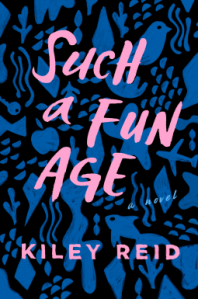
Jivan has seized her chances in life. Having grown up in one of Kolkata’s slums, there was not much to expect, but an NGO enabled her to go to school, learn proper English and see how the middle classes live. Yet, after grade ten, she decides to get a job to support her old and ill parents. The newly earned money also offers luxuries she has never known, cigarettes and even a smartphone. One evening, she witnesses an attack at her local train station and soon after, leaves a comment on Facebook which is widely ignored. Yet, when the culprits cannot be traced, somebody else is needed to pay for the victims and thus, Jivan suddenly finds herself in prison. This can only be a mistake, she is innocent and will soon be free again. But she is totally mistaken there.
Megha Majumdar’s novel is a story about dreams and a better life. Her three protagonists, whose stories are told alternatingly, all have their respective dreams: Jivan wants to live like the middle classes, be able to afford enough food and offer herself some small luxuries. Her friend Lovely, a hijra, dreams of a career in film business and is willing to do everything to promote her career. Jivan’s former teacher PT Sir dreams of power which is unexpectedly provided to him – at the cost of somebody else, but who wouldn’t look for themselves first?
“All of them are ignoring me. The public is wanting blood. The media is wanting death.”
The novel works on several levels, at one end of the scale, there is the personal point of view, at the other end, the political. Looking at the first, we have Jivan and Lovely from the very bottom of the Indian society. They are both working hard and so do Jivan’s parents, nevertheless, they depend on the mercy of others to advance a bit in life. More often than that, they are hit by injustice and at times, beaten in the very sense of the word. It is a highly divided society in which everybody’s place is fixed, upwards mobility is not something to be achieved easily.
On the political level, we see PT Sir and the next big party who have perfected the election campaign in telling people what they want to hear and framing incidents for their own benefit. The individual does not play a role, only in so far as individual politicians want to gain more power and money. One corrupt party is replaced by the next and the novel does not provide the slightest hope of any improvement of the situation.
For the reader, it is quite obvious from the start where all is heading, nevertheless, it is heart-wrenching to follow the unfairness and injustice which are done to Jivan. A great development of the protagonists who are not fully to blame, their behaviour cannot simply be explained by the flaws of their characters, it is the society they live in and to which they simply have adapted to survive. A strong novel which is surely not to be missed.

